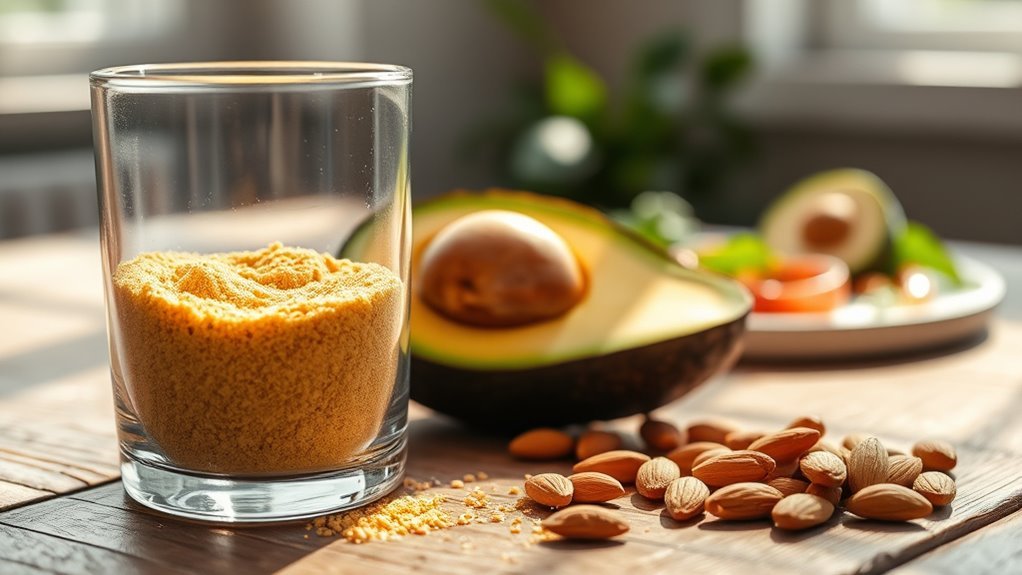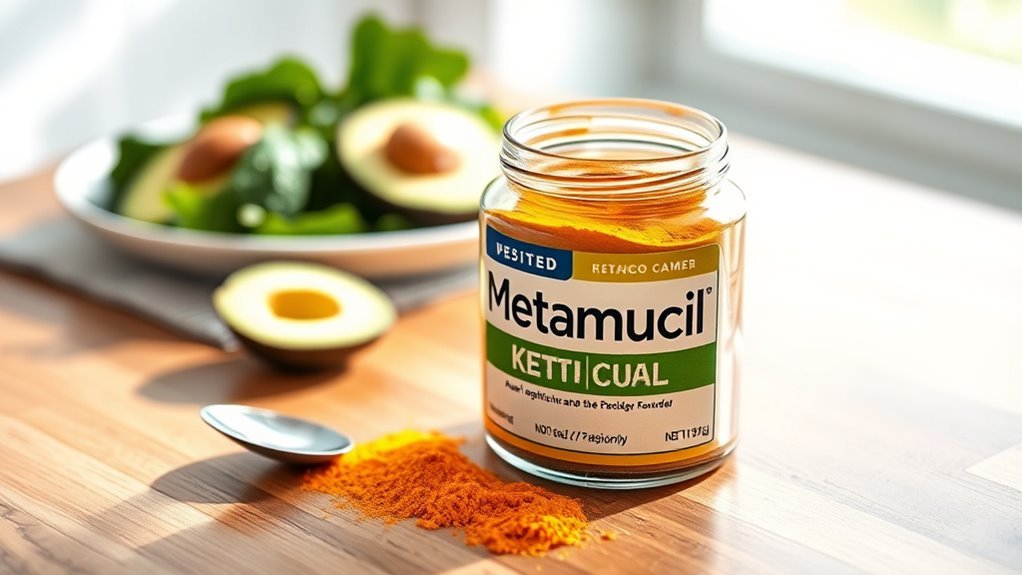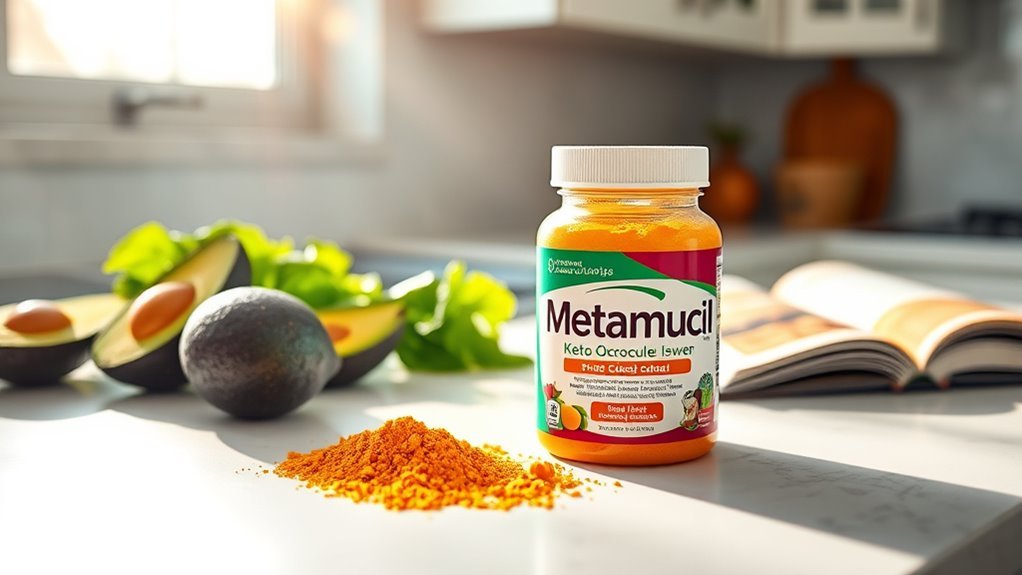Yes, Metamucil is compatible with the ketogenic diet. It’s a fiber supplement made from psyllium husk, which is low in net carbs and provides soluble fiber to support digestion. This can help prevent constipation and promote a feeling of fullness, aiding weight management. Choose a sugar-free version to maintain ketosis, and don’t forget to drink plenty of water with it. For more insights on incorporating it into your keto plan, consider exploring various strategies and recommendations.
Understanding the Ketogenic Diet

When you’re exploring the ketogenic diet, it’s essential to understand its core principles. At its heart, the ketogenic approach emphasizes low carb foods, which drastically reduce your carbohydrate intake, typically to around 5-10% of your daily calories. This shift encourages your body to enter ketosis, a metabolic state where it burns fat for fuel instead of glucose. Key ketogenic principles include increasing healthy fats, moderate protein consumption, and minimizing sugar and starches. For many, this means swapping traditional foods for options like avocados, nuts, and leafy greens. Adopting these principles not only promotes weight loss but can also enhance mental clarity and energy levels. Ultimately, it’s about finding a balance that works for your lifestyle while enjoying the freedom of food choices.
What Is Metamucil?

Metamucil is a fiber supplement primarily made from psyllium husk, a natural soluble fiber derived from the seeds of the Plantago ovata plant. It’s commonly used to support digestive health and can help you manage constipation. One of the key Metamucil benefits is its ability to promote regularity by absorbing water and forming a gel-like substance that eases bowel movements. Additionally, Metamucil usage can aid in lowering cholesterol levels and maintaining healthy blood sugar levels. You can mix it with water or add it to smoothies for an easy way to increase your fiber intake. By incorporating Metamucil into your routine, you’re taking a step toward better overall health and digestive freedom, which many people find empowering.
Ingredients in Metamucil

The primary ingredient in Metamucil is psyllium husk, a natural soluble fiber known for its digestive benefits. This active ingredient helps promote regularity and supports overall gut health. When you consume psyllium, it absorbs water and expands, creating a gel-like substance that can ease constipation and aid in maintaining a healthy digestive tract. Metamucil may also contain additional ingredients for flavoring or preserving the product, but psyllium husk remains the key component. If you’re considering adding Metamucil to your routine, it’s important to understand how these active ingredients work together to enhance your digestive wellness. Always consult with a healthcare professional if you have concerns about incorporating it into your diet, especially if you’re following specific dietary plans like keto.
Carbohydrate Content of Metamucil
While considering a supplement like Metamucil, it’s crucial to look at its carbohydrate content, especially if you’re on a keto diet. Metamucil primarily contains psyllium husk, which is a type of soluble fiber. This means that, while it does have some carbohydrate sources, the net carbs are relatively low. Most of the carbohydrates come from the fiber, which doesn’t greatly impact blood sugar levels. When evaluating fiber types, remember that soluble fiber can aid digestion without kicking you out of ketosis. However, it’s always wise to check the specific product label, as formulations may vary. Balancing your carbohydrate intake with your fiber needs can help you stay aligned with your keto goals while enjoying the benefits of Metamucil.
Fiber and Its Importance on Keto
Fiber plays a pivotal role in any keto diet, serving as a key player in maintaining digestive health and overall well-being. Different fiber types, like soluble and insoluble fiber, can greatly benefit you on your keto journey. Here are three reasons why fiber is fundamental:
- Digestive Health: Fiber promotes regular bowel movements and prevents constipation, essential for those on a low-carb diet.
- Satiety: It helps you feel full, making it easier to stick to your keto goals without feeling deprived.
- Blood Sugar Control: Fiber slows down glucose absorption, helping maintain stable blood sugar levels, which is crucial on a keto diet.
Incorporating adequate fiber into your meals can enhance your overall health while enjoying the freedom of a keto lifestyle.
How Metamucil Affects Digestion
When considering how Metamucil affects digestion, it’s crucial to understand its primary ingredient: psyllium husk. This soluble fiber can help regulate bowel movements and promote gut health. By absorbing water, psyllium forms a gel-like substance that aids in the smooth passage of waste through your digestive system. This process can support the activity of digestive enzymes, enhancing nutrient absorption. Furthermore, regular intake of Metamucil may help in managing constipation or diarrhea, allowing for a balanced digestive environment. However, it’s vital to drink plenty of water when using Metamucil to prevent any potential discomfort. Overall, incorporating psyllium into your routine can be a beneficial choice for maintaining digestive health while enjoying the freedom of dietary choices.
Potential Benefits of Metamucil on a Keto Diet
If you’re following a keto diet, you might find that incorporating Metamucil can offer several potential benefits. Here are a few key Metamucil benefits that can enhance your experience:
- Keto Fiber: Metamucil provides soluble fiber, which is often low in carbs, making it a great fit for keto.
- Digestive Health: This fiber supplement can help maintain healthy digestion, preventing constipation which can occur on a low-carb diet.
- Weight Management: By promoting a feeling of fullness, Metamucil can support your weight management goals, reducing the urge to snack unnecessarily.
Alternatives to Metamucil for Keto
Wondering what alternatives to Metamucil might work for your keto journey? You’ve got plenty of keto-friendly options when it comes to fiber supplements. Psyllium husk powder is a popular choice; it’s low in carbs and offers a good dose of soluble fiber, promoting digestive health. Chia seeds are another great option, providing not only fiber but also healthy fats. Ground flaxseeds can also fit nicely into your regimen, adding fiber and omega-3s. If you prefer a supplement form, look for those that specifically cater to low-carb diets, ensuring they’re free from added sugars. Each of these alternatives can help maintain your fiber intake while aligning with your keto lifestyle, giving you the freedom to choose what works best for you.
Tips for Incorporating Metamucil Into Your Keto Plan
When incorporating Metamucil into your keto plan, it’s important to select the right fiber source and consider the timing of your consumption. Choosing a sugar-free version can help maintain your ketosis while providing essential fiber. Additionally, taking it at specific times, such as before meals, can aid in digestion and promote satiety.
Fiber Source Selection
Incorporating Metamucil into your keto plan can be a smart move for maintaining digestive health while staying within your carbohydrate limits. Understanding fiber types is key, as both soluble and insoluble fibers play important roles. Here are three tips for selecting keto-friendly fibers:
- Choose Soluble Fibers: Opt for fiber sources like psyllium husk found in Metamucil, which can help manage cholesterol and blood sugar levels.
- Incorporate Insoluble Fibers: Include vegetables and nuts to promote gut health and regularity.
- Consider Fiber Supplements: Use Metamucil as a convenient way to meet your daily fiber needs without exceeding your carb limits.
Timing for Consumption
Timing your Metamucil consumption can greatly enhance its benefits while aligning with your keto lifestyle. To maximize fiber intake without disrupting ketosis, consider timing strategies like taking Metamucil before meals. This can help you feel fuller, reducing the temptation to overeat. For ideal dosage, most experts recommend starting with one serving daily and adjusting based on your individual digestive needs. Spacing out your doses throughout the day—perhaps one in the morning and another in the evening—can also support steady fiber levels. Remember to drink plenty of water to aid digestion and prevent any discomfort. By incorporating these timing strategies, you can effectively support your gut health while enjoying the freedom of your keto journey.
Frequently Asked Questions
Can I Take Metamucil While Fasting on a Keto Diet?
Yes, you can take Metamucil while fasting on a keto diet. It’s important to reflect on the fasting benefits, as fiber can help with digestion and keep you feeling full. While some keto supplements may be beneficial, Metamucil’s fiber content can support your gut health without breaking your fast considerably. Just be mindful of the serving size and any potential impact on your ketosis, ensuring your goals align with what you consume.
Is Metamucil Safe for Long-Term Use on Keto?
Yes, Metamucil can be safe for long-term use on keto, especially since it provides a reliable fiber source. Incorporating it into your diet can offer long-term benefits, like improved digestion and regularity. However, it’s crucial to monitor your body’s response and adjust your intake accordingly. If you’re seeking freedom in your diet, balancing fiber sources is key, so consider other options alongside Metamucil for ideal gut health and overall wellness.
How Does Metamucil Affect Blood Sugar Levels?
Metamucil may manage blood sugar levels effectively. The fiber benefits it provides can slow down digestion, helping to stabilize your blood sugar after meals. Studies suggest that soluble fiber, like that found in Metamucil, can reduce blood sugar spikes. While it can be a supportive supplement, it’s important to monitor your overall carbohydrate intake and consult your healthcare provider to guarantee it aligns with your dietary goals and freedom to choose.
Can Metamucil Cause Digestive Issues on Keto?
Yes, Metamucil can cause digestive issues on keto, especially if your fiber intake suddenly increases. While fiber is essential for digestive health, introducing it too quickly can lead to bloating, gas, or constipation. If you decide to use Metamucil, start with a smaller dose and gradually increase it, allowing your body to adjust. Staying hydrated is also vital, as it helps minimize potential digestive discomfort while you adapt to your new fiber levels.
Are There Any Side Effects of Metamucil on a Keto Diet?
While Metamucil can offer great benefits, like improved digestion and regularity on a keto diet, some might worry about potential side effects. You might experience bloating or gas initially, but this often subsides as your body adjusts to the added fiber. Remember, getting enough keto fiber is essential for maintaining gut health. Overall, with moderation and hydration, Metamucil can support your keto journey without major issues. Enjoy the freedom of feeling your best!
Frequently Asked Questions about Metamucil and Keto
1. Is Metamucil suitable for a keto diet?
Metamucil can be suitable for a keto diet, depending on the specific product and its ingredients. The original Metamucil formula contains psyllium husk, which is low in carbohydrates and can help with digestive health. However, some flavored versions may contain added sugars or carbohydrates, so it is essential to check the label for net carbs per serving to ensure it fits within your daily carb limits.
2. How many carbs are in Metamucil?
The carbohydrate content in Metamucil varies by product. The original powder form of Metamucil contains about 1 gram of net carbs per serving, primarily from dietary fiber. However, flavored varieties may contain additional sugars, leading to a higher carb count. Always read the nutritional label to determine the exact carbohydrate content of the specific product you are considering.
3. Can I use Metamucil while following a strict ketogenic diet?
Yes, you can use Metamucil while following a strict ketogenic diet, as long as you choose the right product and monitor your carbohydrate intake. The key is to select the unflavored or original version of Metamucil, which contains minimal net carbs. Always account for any carbs from Metamucil in your daily total to maintain ketosis.
4. What are the benefits of taking Metamucil on a keto diet?
Taking Metamucil on a keto diet can provide several benefits, including improved digestive health, increased fiber intake, and better regulation of bowel movements. Since the keto diet can sometimes lead to digestive issues due to lower fiber intake from reduced carbohydrates, Metamucil can help alleviate these concerns. Additionally, fiber can help you feel fuller longer, potentially aiding in weight management.
5. Are there any side effects of using Metamucil on a keto diet?
While Metamucil is generally safe for most people, some may experience side effects such as bloating, gas, or stomach cramps, especially if they are not used to a high-fiber diet. It is important to increase fiber intake gradually and drink plenty of water to help minimize these effects. If you have any specific health concerns or conditions, it is advisable to consult with a healthcare provider before introducing Metamucil into your diet.
References
- https://www.ncbi.nlm.nih.gov/pmc/articles/PMC6511964/
- https://www.healthline.com/nutrition/metamucil-keto
- https://www.webmd.com/diet/metamucil-and-keto-diet
- https://www.wisewell.com/blogs/wisewell/metamucil-keto-friendly
- https://www.clevelandclinic.org/health/articles/what-is-metamucil
- https://www.verywellfit.com/metamucil-and-keto-diet-5116357
- https://www.keto-diet-resource.com/metamucil-on-keto/


